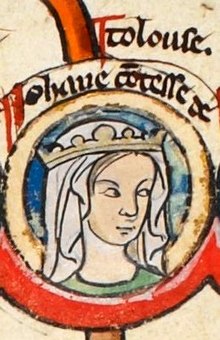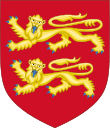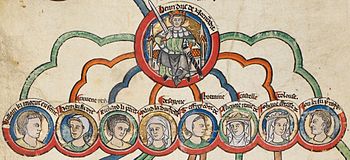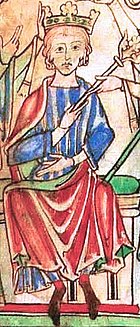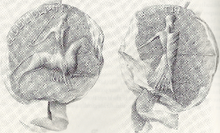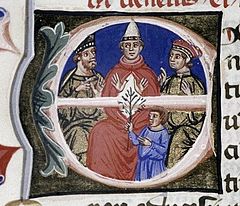A Cypriot marriage and an extended honeymoon in Palestine
:max_bytes(150000):strip_icc():format(webp)/richard-lionheart-large-56a61b535f9b58b7d0dff204.jpg?resize=159%2C112&ssl=1)
Richard having little faith in Tancred’s ability to behave himself had taken the precaution of taking Joan with him. As the ship left Messina, Richard, standing on deck, surveyed the calm Mediterranean waters and reflected on his first mission on foreign soil.

The king felt a sense of ‘mission accomplished’ but there were some lingering feelings of possible regret. With his faithful retainer Ranulf at his side, Richard, squinting into the horizon tugged at his beard and said:
‘You know Ranulf, I really had to stop and put that bounder, Tancrad in his place. I really had!’
‘Verily sire, these Sicilian characters are a very slippery commodity. His conduct towards the Princess Joan was an act of intolerable indecency. ‘Tis good that he was hurt where it hurts most, the purse.’ The funds extracted from his foul paws will be put to good use and all in the name of God’!
‘Yes, Ranulf, you speak with wisdom. However I am still a little troubled at my behaviour towards the Princess Alice. I was brought up to be a chivalrous knight, but I was a little less than gallant towards Philip Augustus’ sister. But when I looked upon her countenance ….I ..I saw…….’
‘The face of a dog, sire.
‘I fear that you are right, Ranulf. I know that a prince cannot marry for love and goodness knows, mistresses there are aplenty, and of them good use can and does be made. However it must always be remembered that a king does have a duty to produce an heir, and…..but my God, there are limits! It would have required an effort of truly herculean dimensions!’
‘No night would have been dark enough, sire, nor the interior decor of any boudoir black enough to facilitate the satisfactory conclusion of the required deed. As you so rightly say, sire, duty does have limits but these do not stretch to infinity.’
‘Never a truer word spoken, Ranulf!’ King Philip Augustus was somewhat indignant at the hurt caused to his sister, the lady Alice but thankfully he was mollified by the 10, 000 marks that I gave him in compensation.’
‘ T’was money well spent, sire. Gold and silver never served a better purpose. In any case it was coins squeezed out of that wretched Sicilian cur, Tancred, which remedied the unfortunate situation!’
‘By God’s teeth, Ranulf, your words ring with the truth of the almighty. Tis done, we to the Holy Land, and God speed!’
One potential bride down, but another appears Richard’s mother, the redoubtable Eleanor had been indulging in the age old practice of match making.
Eleanor of Acquitaine.
Eleanor (Bonny Mama) had joined her favourite son in Sicily, but she did not arrive unaccompanied. Bonny Mama had with her a nuptial package for Richard, Berengaria of Navarre. The Princess had a comely appearance, and the Lionheart purred with satisfaction.
‘It’s going to be a great spring !
Bonny Mama has done an incredible thing!
She has introduced me to a really great girl
With whom I will dance the holy nuptial twirl!’
We will wed in Cyprus with a feast, where we will all wine and dine!
Followed by an action packed honeymoon in ancient, sunny Palestine!
This sounds good and everything will be fine!’
Berengaria of Navarre.
:max_bytes(150000):strip_icc():format(webp)/Berengaria-0-56aa26503df78cf772ac8be1.jpg?resize=237%2C158&ssl=1)
There was however a hitch which proved to be a blessing in disguise. The area was hit by a storm which shipwrecked a number of the fleet on to the shores of Cyprus. The ruler, Isaac Comnenus imprisoned the survivors, and worse still would not grant free passage to the ship carrying the King’s fiancee, Berengaria, and sister Joan into the harbour in Cyprus. They were left in the waters outside of the island bereft of essential supplies. Was this any way to treat women of royal blood? This was an impertinence unheard of! What was it with these Mediterranean princes? Tancred had been bad enough but this fellow, Isaac, was if anything worse. Richard resolved to terminate Isaac’s command.
The crusader army very quickly conquered the island and Isaac was soon captured. This had two important consequences. Firstly, it meant that Richard had the pick of any of the plum venues that the island had to offer in which to hold his marriage to Berengaria. This, as befits its importance promised to be a most sumptuous affair and it most certainly was. Secondly, the island’s position in the eastern Mediterranean made it of great strategic significance as a launching pad for conducting military operations in the middle east. Indeed successive English/British governments would hold the island for centuries for this very reason.

The pleasantries of the nuptials most pleasantly concluded and the island safely secured for his own strategic interests, Richard set sail for the Holy Land.


